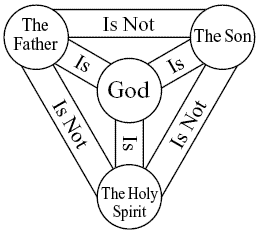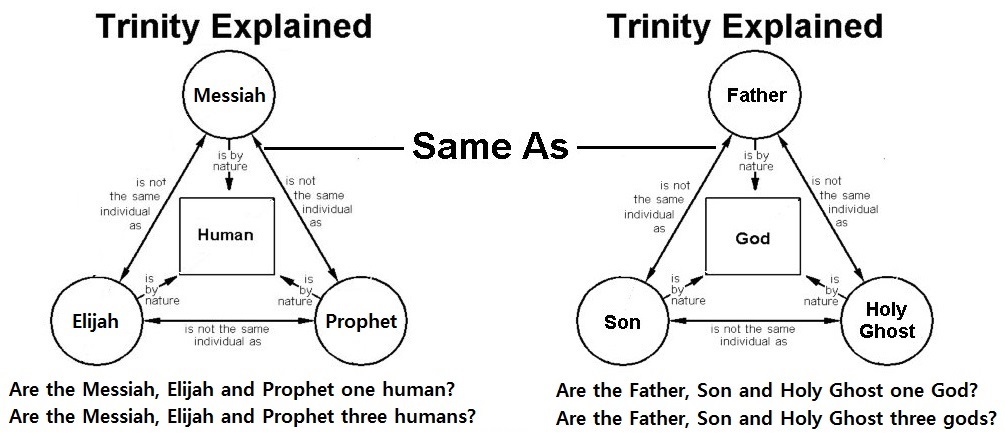Many Prophets, One Message
A CALL TO THE TRUTH
Ten Ways the Bible Disproves the Trinity.
The doctrine of the Trinity defines God as one being who eternally exists as three distinct Persons — the Father, Son and Holy Spirit. Put simply, “one God in three persons”. Each of these persons has their own will, personality and they each perform different roles. While distinct from one another in these regards, in all else they are stated to be co-equal, and “each is God, whole and entire”. This is a typical diagram used by Trinitarians to summarise the doctrine of the Trinity:
Now, if the Trinity represents the truth about the nature of God Almighty, and was preached by Jesus (peace be upon him), then one would expect this to be reflected clearly throughout the Bible. Moreover, one would not expect to find anything which negates the doctrine. What follows are ten reasons, taken from the Bible, that disprove the doctrine of the Trinity.
1. God does not change.
The Bible describes God as unchanging in nature:
“I the Lord do not change. So you, the descendants of Jacob, are not destroyed. [Malachi 3:6]They will perish, but you will remain; they will all wear out like a garment. You will change them like a robe, and they will pass away, but you are the same, and your years have no end. [Psalm 102:26-27]Every good and perfect gift is from above, coming down from the Father of the heavenly lights, who does not change like shifting shadows. [James 1:17]
Trinitarians believe that God temporarily took on flesh when the second person of the Trinity, the Son, entered into humanity as Jesus. At this point God was subject to the limitations of human beings, such as needing to eat, drink and sleep, because of the human nature of Jesus. Once Jesus was crucified, resurrected and ascended back to God, he took on a new glorified, spiritual body and is free of all the limitations he had when he was here on earth.
Because Trinitarians believe that Jesus did not cease being God whilst he was here on earth, there is conflict with the statements of the Bible that affirm God’s unchanging nature. You can’t have an unchanging God on the one hand, and a ‘person’ of Him that is changing. If Jesus took on a human nature, whilst at the same time still being God, then the implication is that in becoming man, the nature of God changed. When Jesus then ascended and took on a glorified, spiritual body, whilst still being God, then the nature of God changed once again. Here is a diagram which summarises the Trinitarian claims and why they are a problem (please click on picture to enlarge):
Now, Trinitarians often try to escape this predicament by saying that the nature of God didn’t really change, rather an additional nature was taken on. This is a game of semantics, regardless of what happened – the taking on of an additional nature, a mixing of natures etc. – the overall nature of God is different to what it was before. If it wasn’t, then one has to question the purpose of the incarnation in the first place! Now imagine if the reverse was the case, a regular human being took on a divine nature in addition to their human nature. No Trinitarian would argue that this scenario doesn’t result in a change of nature to the human being. They wouldn’t argue, “well, this man-God hasn’t really changed in nature, his original finite human nature is only being complemented by an additional infinite nature”. Yet this scenario is no different to God becoming man, the only difference is the direction of change (God → man v.s. man → God). Clearly, God changed, and clearly, the Trinity conflicts with God’s unchanging nature.
2. It compromises God’s absolute perfection.
God Almighty by definition is absolutely and eternally perfect in nature, He cannot degrade into a worse state and He cannot improve into a better state.
We’ve already seen that belief in the Trinity necessitates that the nature of God changed. This raises an uncomfortable question: was the nature of God more or less perfect when He took on flesh and entered into humanity? If He was more perfect before becoming human, then this implies that God’s perfect nature was temporarily compromised whilst Jesus was here on earth as a man. If however He was more perfect after becoming human, then this implies that God was eternally inferior in nature beforehand. Both propositions are blasphemous.
3. All persons of the Trinity are equal, but some are more equal than others.
Anyone who speaks a word against the Son of Man will be forgiven, but anyone who speaks against the Holy Spirit will not be forgiven, either in this age or in the age to come. [Matthew 12:32]
If the three persons of the Trinity are equal in importance and all are 100% God, then why is speaking a word of blasphemy against the Holy Spirit an unforgivable sin, while doing a similar act against the Son, Jesus, can be forgiven? Since only the Holy Spirit has the right to not be blasphemed against, it seems that some persons of the Trinity are more equal than others!
4. Jesus acknowledges that he has a God.
Jesus said, “Do not hold on to me, for I have not yet ascended to the Father. Go instead to my brothers and tell them, ‘I am ascending to my Father and your Father, to my God and your God.’” [John 20:17]
Trinitarians attempt to explain such statements away by saying that it was only the human side of Jesus being subservient to God, not his divine side. The problem is that later in the Bible, after Jesus has ascended and cast aside all human limitations, he is still saying “my God”:
I am coming soon. Hold on to what you have, so that no one will take your crown. The one who is victorious I will make a pillar in the temple of my God. Never again will they leave it. I will write on them the name of my God and the name of the city of my God, the new Jerusalem, which is coming down out of heaven frommy God; and I will also write on them my new name. [Revelation 3:11-12]
So their explanation of the human side of Jesus doing the talking falls apart when he is still using the same language of subservience as he did whilst he was here on earth.
5. Jesus surrenders his kingdom to God.
Then the end will come, when he hands over the kingdom to God the Father after he has destroyed all dominion, authority and power. For he must reign until he has put all his enemies under his feet. The last enemy to be destroyed is death. For he “has put everything under his feet.” Now when it says that “everything” has been put under him, it is clear that this does not include God himself, who put everything under Christ. When he has done this, then the Son himself will be made subject to him who put everything under him, so that God may be all in all. [1 Corinthians 15:24-28]
If Jesus is fully God, and an equal member of the Trinity, then why does Jesus give back his kingdom to God the Father when our world comes to an end? In addition, why is Jesus made subject to God after he has surrendered his kingdom over? Clearly, God is forever supreme over all, including Jesus.
6. Not defined anywhere in the Bible.
The nature of God is undoubtedly the most fundamental aspect of a religion. Scripture should provide a clear picture of who our Creator is, otherwise how can we be expected to properly worship that which we don’t understand?
If God wanted humanity to believe in His Triune nature, then why isn’t it clearly and explicitly defined anywhere in Scripture? There is no statement to be found anywhere in the Bible where God is described as being three co-equal persons, Father Son and Holy Ghost. This is in spite of the fact that there were numerous opportunities that were presented to Jesus where he could have spelled this out in detail:
One of the teachers of the law came and heard them debating. Noticing that Jesus had given them a good answer, he asked him, “Of all the commandments, which is the most important?”“The most important one,” answered Jesus, “is this: ‘Hear, O Israel: The Lord our God, the Lord is one. Love the Lord your God with all your heart and with all your soul and with all your mind and with all your strength.’ The second is this: ‘Love your neighbour as yourself.’ There is no commandment greater than these.”“Well said, teacher,” the man replied. “You are right in saying that God is one and there is no other but him. To love him with all your heart, with all your understanding and with all your strength, and to love your neighbour as yourself is more important than all burnt offerings and sacrifices.” [Mark 12:29-33]
It’s important to note that the Jewish understanding of the commandments rejects all notions of God being a Trinity. So in the passages above, by simply repeating the commandment about God being One, Jesus is re-affirming the Jewish understanding of God’s nature and therefore rejecting the Trinitarian understanding. This was the perfect opportunity for Jesus to correct the Jew’s misconceptions about God and give him the Trinitarian understanding of God being three co-equal persons, Father Son and Holy Ghost. As we have seen the exact opposite is the case, his answers provides ammunition to use against the Trinity.
Because there is a lack of a clear, explicit statement in support of the Trinity, what we find is that in order to support the doctrine of the Trinity using the Bible, Trinitarians have to cobble together bits and pieces of unrelated scripture in order to try and form a picture of a Triune God. Is the Bible a book of guidance or a Da Vinci code?
7. Fabrications inserted into the Bible to support the doctrine.
Now, there is a single statement in some versions of the Bible that comes very close to the doctrine of the Trinity. This verse is known as the Johannine Comma:
“For there are three that bear record in heaven, the father, the word, and the Holy Ghost: and these three are one” [1 John 5:7]
This verse used to be in all Bibles; however the editors of the Revised Standard Version (RSV) and New International Version (NIV) have removed the verse (please click on picture to enlarge):
Notice how verse 7 in the RSV is different to verse 7 in the KJV. The RSV does not contain the mention of the Trinity. Also notice that verse 7 in the NIV is different to not only the KJV but also the RSV. The NIV also does not contain the mention of the Trinity. The RSV and NIV have had to split other verses into two parts in order to make up for the deletion of the Johannine Comma, this is so that the verse numbers across all three versions of the Bible line up the same.
The King James Version (KJV) has grave defects, and so these newer versions of the Bible (which are based on older and hence more reliable manuscripts) were produced. Here is the NIV footnote regarding this verse:
Late manuscripts of the Vulgate testify in heaven: the Father, the Word and the Holy Spirit, and these three are one. {8} And there are three that testify on earth: the (not found in any Greek manuscript before the sixteenth century)
In other words, it is a fabricated verse that was inserted into the New Testament over 1,500 years after Jesus. Trinitarians should reflect on this question: why is the only clear Scriptural evidence for their beliefs a fabrication? Clearly, it had to be forced into the Bible to lend support for the doctrine because it is unbiblical.
8. Trinitarian scholars manipulate the Bible to protect the doctrine.
Now this is eternal life: that they know you, the only true God, and Jesus Christ, whom you have sent. [John 17:3]
This statement in the Bible is devastating to the doctrine of the Trinity, as it clearly identifies God as the only true God to the exclusion of Jesus. Here Jesus defines his own position as the Messiah, distinct from the Godhead, which consists of the Father alone.
In fact so devastating is this statement, that major pro-Trinitarian scholars of the past have resorted to manipulating the Bible in order to protect the doctrine of the Trinity. We note the remarkable comment of the celebrated Church Father Augustine. Augustine of Hippo is viewed as one of the most important Church Fathers in Western Christianity. It was so difficult for Augustine to harmonise John 17:3 with the doctrine of the Trinity, that this immensely influential church leader actually restructured Jesus’ words to accommodate both the Father and Son in the Godhead. Augustine, in his “Homilies on John”, boldly asserts that John 17:3 means:
“This is eternal life, that they may know Thee and Jesus Christ, whom Thou hast sent, as the only true God.” [1]
This daring alteration of the Bible seriously distorts the original meaning of the words in order to include Jesus in the Godhead. Such forcing of the text merely exposes Augustine’s desperation to protect his creed in the Bible.
9. God is above Jesus in hierarchy.
But I want you to realize that the head of every man is Christ, and the head of the woman is man, and the head of Christ is God. [1 Corinthians 11:3]
This statement was uttered after Jesus had ascended and cast aside his human limitations. If the Trinity is true, then surely Paul (the author of the above statement) would have uttered something along the lines of “man is the head of a woman, and God and Christ are the head of man” which would imply a horizontal relationship between the persons in the Trinity. Clearly, God is above Jesus in this hierarchy, implying no co-equality between them, and thus there is no Trinity.
10. Necessitates the belief in three gods.
Now the Pharisees who had been sent questioned him, “Why then do you baptize if you are not the Messiah, nor Elijah, nor the Prophet?” [John 1:24-25]
Here John has described a ‘trinity’ of persons, the Messiah, Elijah and the Prophet. These are three distinct persons, each with their own will, personality and function. What they share in common is their nature, humanity. We can convert this into a similar diagram that Trinitarians use to explain the Trinity (please click on picture to enlarge):
No one in their right mind would say that the Messiah, Elijah and the Prophet are three persons in one human, even though they all share in the same nature – humanity. Yet this is exactly what they are saying with regards to the Trinity. Clearly, Trinitarians believe in three separate gods, not one, just as they believe in three separate human beings. This is a clear violation of what Moses, Jesus and all the Prophets of the Bible taught: God is One.
References
1 – Homilies on John, tractate CV, chapter 17.


